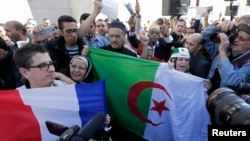The killing of a French hostage in Algeria's mountains last week opens a new chapter in the battle against radical Islamists - and casts a spotlight on a complicated relationship between France and its former colony. Both are no strangers to terrorism, but is a common enemy enough to coordinate their efforts in battling Islamist terrorism today - and to put a painful past behind them?
In Paris, a rally took place in front of the city’s main mosque to denounce radical Islam. During the past week, commemorations and protests have been held across France following the beheading of French hostage Herve Gourdel. This time, the killers belong to a shadowy group called Jund al-Khalifa, or Soldiers of the Caliphate.
Gourdel's execution took place shortly after the Islamic State group (IS) called for Muslims to kill Westerners for launching airstrikes against it. But the beheading was not in Iraq or Syria where IS is based, but in the mountains of France's former colony, Algeria.
For many Algerians, Gourdel's death digs up painful memories. In the 1990s, more than 100,000 people were killed after Muslim extremists launched a civil war against the military-backed government. Algerians, like 35-year old Ilyes Bouras, who was among those at the Paris mosque, call it the "black decade."
Bouras says Algerians lived in daily fear. He says the Islamists are just thugs and bandits who want power. When Herve Gourdel was kidnapped, many hoped Algerian forces would find him, but he died and, Bouras says, that frightens him. He says he hopes Algeria and other Muslim countries will respond to the mounting extremism.
North Africa expert William Lawrence, a visiting professor at George Washington University, says Gourdel's death does not open a new chapter of violence in Algeria.
"We are not seeing a return to the 1990s. We are seeing a continuation of the 2000s, although the tactics are new. The war in Algeria was sort of declared over in 2002, but it really never ended entirely. And in the 2000s (decade), upwards of 400-500 civilians in Algeria were still being killed in a low-intensity conflict," says Lawrence.
Battle between old, new
What is different are the players. France 24 analyst Wassim Nasr says the Soldiers of the Caliphate is the first radical group to split with the more established al-Qaida in North Africa and ally itself with the Islamic State group. In some ways, he told the TV channel, the move reflects a battle between old and new generations of Islamists.
Nasr says al-Qaida never had a political plan, all it had was a plan of terror. He says, however reprehensible, the Islamic State group has a political plan, one that attracts young people.
The Caliphate group leader, Abdelmalek Gouri, belonged to the Armed Islamic Group, or GIA, that fought Algerian forces in the 1990s conflict.
At the height of the civil war, the GIA also bombed Paris metros, hijacked an Air France flight, and assassinated French nationals in Algeria.
Despite their common enemy, Algeria and France have tense relations stretching back to Algeria's war of independence a half-century ago.
Algeria's authoritarian government tends to go it alone in fighting terrorists.
That was seen last year, when Algerian troops stormed the Ain Amenas desert gas complex, putting a quick and bloody end to an international hostage crisis.
But researcher Kader Abderrahim of the French Institute of International and Strategic Relations says Algeria needs French drones and other support to take on highly mobile groups located in remote areas.
"Now Algeria is facing [the need] to change its doctrine. Not only diplomatic doctrine but war doctrine against terrorism. And the cooperation with France is not only necessary but it is absolutely necessary to face this new kind of war, if they want to fight them correctly. If not, I am not very optimistic," says Abderrahim.
Quiet cooperation
Professor Lawrence says French and Algerian authorities are quietly cooperating on counter-terrorism.
"It is not unlike the U.S. relationship with Algeria, in that there is a close working security relationship and most of the rest of the relationship is relatively weak... these are complex relationships, but certainly security cooperation is one of the most important facets in both French-Algerian and U.S.-Algerian cooperation," says Lawrence.
In Algeria, as in France, Gourdel's killing has drawn reactions of shock and anger.
"It is worth stating that the Algerian population is not only war-weary, which we often hear, but is highly vigilant against terrorism. So if you have a new generation coming up, it is just a portion of the generation that is not imbued with this general consensus in Algeria of being sickened about what happened in the '90s and early 2000s… and a complete unwillingness to revisit that," says Lawrence.
Meanwhile in France, radical Islam resonates differently. Hundreds of young people have left the country to join Islamic State militants or other jihadist movements.
Ethnic Algerians make up a large chunk of France's estimated five million Muslims. Most condemn the violence and fear being stigmatized. But the French Algerian story is shaped by a difficult colonial past and unresolved grievances, which may determine how they take on the new enemies of today.










